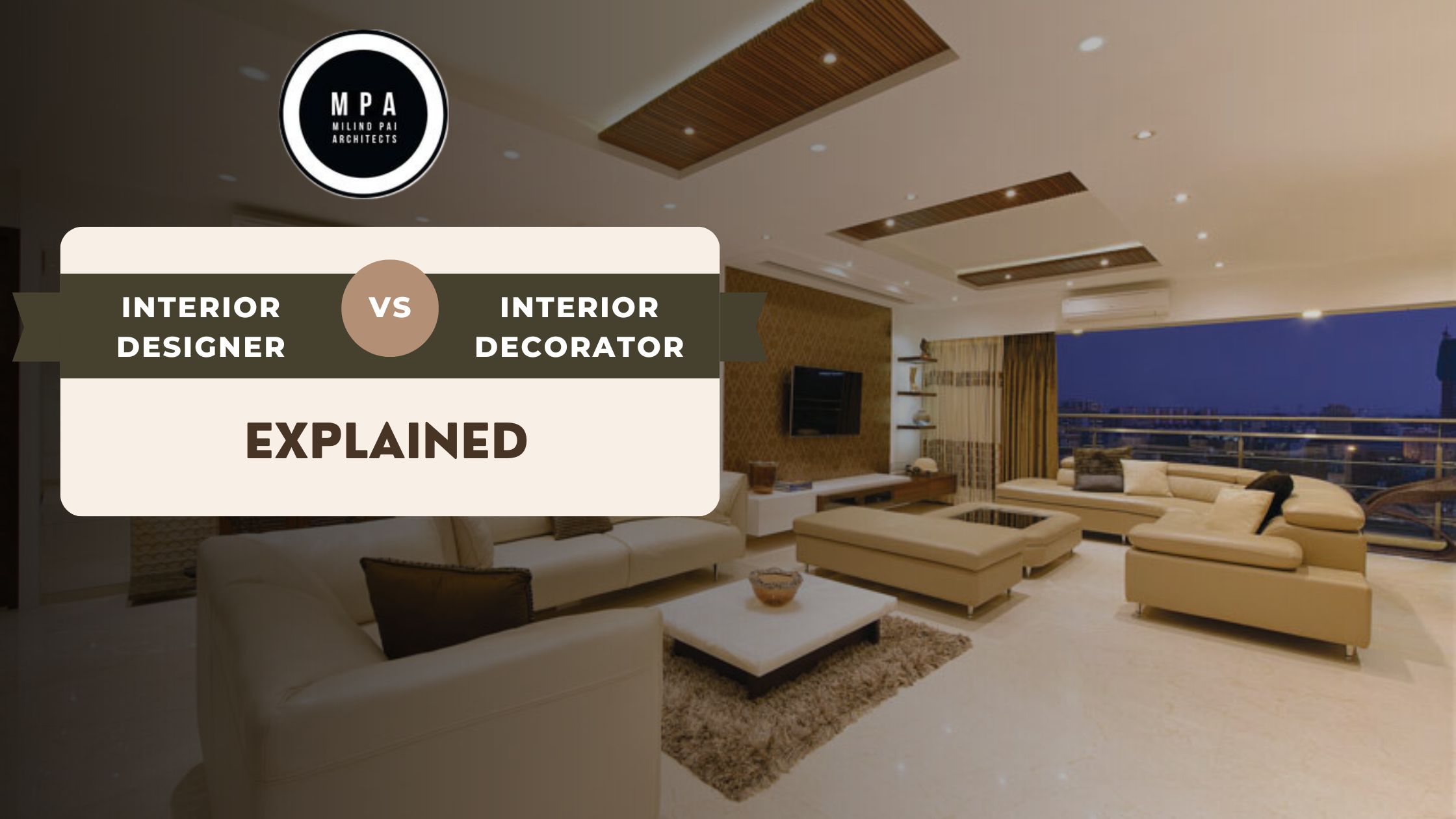Interior Designer vs. Interior Decorator
When it comes to transforming your living space into a beautiful and functional haven, the terms “interior designer” and “interior decorator” are often used interchangeably. However, these two roles represent distinct professions with unique skill sets and responsibilities. In this blog, we will explore the differences between interior designers and interior decorators to help you understand who to hire for your specific needs.
So How is an Interior Designer is Different from an Interior Decorator?
-
Expertise:
Interior designers are trained to create functional and aesthetically pleasing spaces. They possess a deep understanding of spatial arrangements, architectural principles, and the technical aspects of interior design. This knowledge allows them to plan and design interior spaces that not only look good but also serve a specific purpose.
-
Responsibilities:
Interior designers are involved in various aspects of a project, from the initial conceptualization to the final execution. Their responsibilities often include:
Space Planning: Interior designers assess the layout of a space and plan how it can be used most effectively. They ensure that the space flows well and is functional for its intended purpose.
Color and Material Selection: Interior designers have a strong grasp of color theory and can select paint colors, materials, and finishes that complement each other and create a cohesive design.
Furniture and Fixture Selection: They choose furniture, lighting, and fixtures that not only match the design concept but also fit within the space.
Building Codes and Regulations: Interior designers are knowledgeable about local building codes and regulations, ensuring that all design elements meet legal requirements.
Collaboration: They work closely with architects, contractors, and other professionals to ensure the design vision is executed correctly.
Project Management: Interior designers often oversee the project, managing budgets, timelines, and coordinating with contractors and vendors.
-
Licensing:
In many countries, states, or regions, interior designers are required to be licensed to practice professionally. Licensure typically involves passing an examination that tests the designer’s knowledge of building codes and regulations.
Need to Spruce Up Your Home? Hire an Interior Decorator!
-
Expertise:
Interior decorators are experts in enhancing the visual appeal of a space. They have a keen eye for aesthetics, color coordination, and arranging decor elements to create a harmonious look. Their primary focus is on the aesthetics of a space rather than its functional aspects.
-
Responsibilities:
Interior decorators primarily focus on the decorative aspects of a space. Their responsibilities often include:
Color Schemes: Decorators select color palettes and paint for walls, as well as fabrics for furniture and decor elements.
Furniture and Accessories: They choose furniture, accessories, and decor items to enhance the overall look of the space.
Textiles and Fabrics: Interior decorators work with textiles such as curtains, drapes, and upholstery to create a cohesive design.
Art and Decorative Items: They select artwork and decorative items that align with the design style and theme.
Arrangement: Decorators arrange furniture, decor items, and accessories in a visually pleasing manner.
Personalization: They often work closely with clients to understand their preferences and incorporate their personal style into the design.
-
Licensing:
In many places, interior decorators do not require a license to practice professionally. However, some decorators may choose to become certified by professional organizations to enhance their credibility.
Interior Designer vs Decorator: Difference Between Them
Now that we’ve covered the basic distinctions between interior designers and interior decorators, let’s delve into some of the key differences in more detail:
1. Education and Training:
Interior designers typically have formal education and training, often holding a bachelor’s degree or higher in interior design. They are well-versed in a wide range of subjects, including architectural principles, spatial planning, and building codes. Interior decorators may have completed design courses or certifications, but they are not required to have formal design education.
2. Scope of Work:
Interior designers have a broader scope of work that encompasses both aesthetics and functionality. They are responsible for space planning, ensuring that the layout and design elements serve a specific purpose. Interior decorators, on the other hand, primarily focus on enhancing the visual appeal of a space. They work with decor elements, color schemes, and furniture to create a cohesive and pleasing look.
3. Technical Knowledge:
Interior designers possess technical knowledge related to construction, architecture, and building codes. They can work on projects that involve structural changes, such as wall removals or building additions. Interior decorators do not have the same level of technical expertise and do not typically engage in structural modifications.
4. Licensing and Regulation:
In many regions, interior designers are subject to licensing and regulation. To become a licensed interior designer, one must pass an examination that assesses their knowledge of building codes and regulations. Interior decorators, on the other hand, are generally not subject to the same licensing requirements.
5. Collaboration:
Interior designers often collaborate with architects, contractors, and other professionals to ensure that the design is executed correctly. They play a key role in the planning and coordination of various aspects of a project. Interior decorators primarily work on the decor and aesthetics of a space and may have limited involvement in the construction or renovation process.
6. Cost and Budget:
Interior designers are typically involved in project management and budgeting. They help clients make informed decisions about where to allocate their budget for maximum impact. Interior decorators are more focused on decor and may have a narrower scope when it comes to budget considerations.
When to Choose an Interior Designer or Interior Decorator
The choice between hiring an interior designer or an interior decorator depends on your specific needs and the scope of your project:
Choose an Interior Designer If:
- You are planning a major renovation or new construction.
- You need assistance with space planning and layout.
- Structural changes are required in your project.
- You want a professional who can manage the entire design process, from conceptualization to project completion.
- Your project involves adherence to building codes and regulations.
Choose an Interior Decorator If:
- You are primarily concerned with the aesthetics of a space.
- You want to enhance the visual appeal of your home.
- You are not planning significant structural changes or renovations.
- You want to personalize your space with decor and accessories.
- You are working within a specific budget for decor and furnishings.
- Collaboration Between Interior Designers and Decorators
It’s essential to recognize that interior designers and interior decorators can work together collaboratively on a project. In fact, their complementary skills can lead to a more comprehensive and well-rounded design. Interior designers can focus on the architectural and functional aspects of a space, while interior decorators can enhance its aesthetics and decor.
When working with both professionals, it’s crucial to establish clear communication and roles within the project. This collaboration ensures that the design vision is holistic and serves both the functional and visual needs of the client.
From Concept to Creation, Our Interior Designers Are Here to Make Your Dream Space a Reality. Call on 022 – 26732274/ +91 80823 20002 and Get in Touch!



